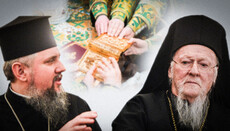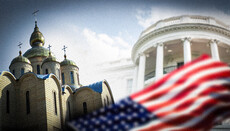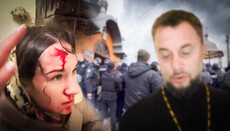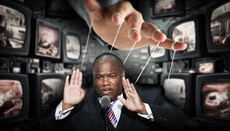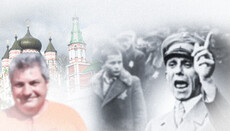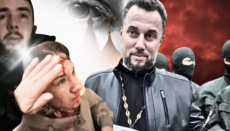Tactics of double standards: how USA interferes in life of Orthodox Church
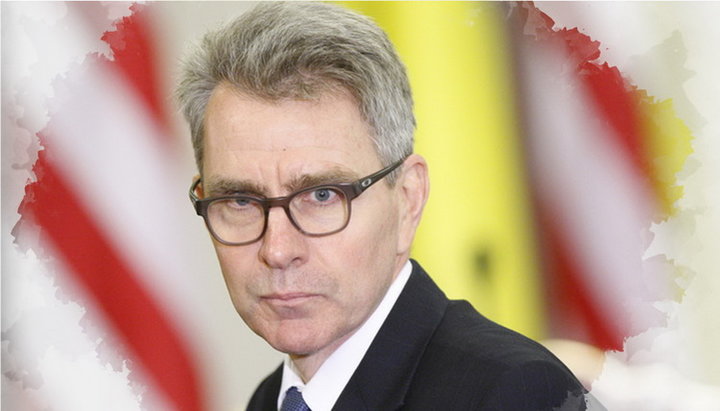
What is behind the concern of US officials about the rights of the Orthodox?
At the Athens conference on disinformation and news manipulation held on March 5, the ex-US Ambassador to Ukraine and now the Ambassador to Greece Jeffrey Payette made a strong statement about Russia’s efforts to undermine the authority of Patriarch Bartholomew: ”We’ve seen evidence of this kind of manipulation of information in Greece. We’ve seen Russian efforts in the Church, the efforts to undermine the role of the Ecumenical Patriarch.”
He particularly stressed that “the purpose of this event tonight is to raise awareness so that Greece’s democratic institutions, Greece’s free press — which are all quite strong — can be alert and able to respond”.
It is not difficult to guess what this “response” should be, from the US point of view. And there is only one right criterion – the American government supports those who serve the interests of the American state.
Probably, based on these prerequisites, Jeffrey Payette believes that any criticism of Patriarch Bartholomew is an attempt to “undermine his role” and the full support for the Phanar by the US Department of State is only defending “religious rights and freedoms”.
However, it’s not that simple.
US State Department and Tomos
The US government has never concealed the fact that one of the essential moments of its policy on the territory of Ukraine is and will be the “church issue”. Therefore, the Tomos and the related events received full support from the State Department. We present only some of the latest evidence.
One of the first to congratulate Ukrainians on getting the Tomos was not representatives of our neighboring countries, Poland or Lithuania, but representatives of the US Embassy in Kiev, which wrote on December 16 (the second day after the “Unification Council”) on its Twitter: “We support the right of all Ukrainians to govern their religion according to their beliefs. Tolerance and restraint are a key to a peaceful transitional period so that people with different religious beliefs can live and thrive together.”
On December 17, the Deputy Head of the State Department Press Service Robert Palladino stated that “The creation of this Church was a historic event for Ukraine. The United States maintains its strong support for Ukraine and believes that religious freedom should not be externally impeded."
On January 10, that is four days after receiving the Tomos, US Secretary of State Michael Pompeo wrote: “The January 6th announcement of autocephaly for an independent Orthodox Church of Ukraine marks a historic achievement as Ukraine seeks to chart its own future. On this momentous occasion, the United States reiterates its unwavering support for a sovereign, independent Ukraine.”
“The creation of this Church was a historic event for Ukraine. The United States maintains its strong support for Ukraine and believes that religious freedom should not be externally impeded.”
Deputy Head of the State Department Press Service Robert Palladino
On February 8, US Ambassador for International Religious Freedom Samuel Brownback said that Washington was “pleased to see” the actions of Constantinople Patriarch Bartholomew on creating a new church structure in Ukraine and believe that they should be implemented.
In turn, the head of the Kiev Patriarchate Filaret Denisenko awarded former CIA Deputy Director Jack Devine with the Order of St. Andrew the First-Called, and “Metropolitan” Epiphany Dumenko thanked the United States for its support.
This position of the United States in relation to church issues in Ukraine has allowed a number of domestic and foreign experts to make a logical conclusion that the US Department of State not only supported but also, in a sense, oversaw the bestowal of the Tomos for the OCU. For example, Ukrainian political analyst Andrei Vidishenko believes that American politicians have the opportunity to put pressure on the Phanar, using the Greek Orthodox Archdiocese of America as a tool for their political technologies.
There is nothing strange in this because the United States and the Phanar have been cooperating very fruitfully for quite a long time.
US State Department and Phanar
On October 27, 2018, former US Vice President Joseph Biden, who particularly stressed the importance of creating the OCU, was among the guests at the Patriarch Athenagoras Award of Human Rights bestowed upon Fr. Alexander and Presbytera Xanthi Karloutsos for their valuable services to the Church and Greek-American Community.
By the way, the same event, which was organized by the Patriarchate of Constantinople at the Hilton Hotel, was attended by a representative of His All Holiness Ecumenical Patriarch Bartholomew, Metropolitan Emmanuel of France – the one that presided at the schismatic “Unification Council”.
So, during the award ceremony, Fr. Alexander Karloutsos, addressing Joseph Biden, said: “Our political ties to the Oval Office began when then Archbishop Athenagoras was called in November of 1948, to lead the Sacred See of Saint Andrew as part of the Truman Doctrine and Marshall Plan, to keep the First Throne of Orthodoxy from being trapped behind the Iron Curtain and falling into the communist hands of Stalin’s Soviet Union. That is why President Truman decided personally to send his trusted friend to Constantinople on his presidential plane, known then as the Sacred Cow.”
Father Alexander is a big man. He is the executive advisor to the Faith: An Endowment for Orthodoxy and Hellenism Foundation, whose goal is to finance the institutions of the Greek Orthodox Archdiocese of the United States. Many analysts believe that precisely because of this, the Foundation is one of the tools of American influence in Greece. So, he knows what he is talking about.
“President Truman decided personally to send his trusted friend to Constantinople on his presidential plane, known then as the Sacred Cow.”
Fr. Alexander Karloutsos
Indeed, the election of Patriarch Athenagoras and the role of the United States in this operation have been written about many times. The most detailed analysis of everything that accompanied the event can be found in the article by priest Pavel Yermilov "The Entry of the Constantinople Patriarchate into the Mainstream of US Foreign Policy in the Early Years of the Cold War".
The candidacy of Patriarch Athenagoras arose as a result of the refusal of Patriarch Maxim to cooperate with the American special services, which was extremely important for the United States in the process of confronting the Soviet Union. Behind all the beautiful words about promoting universal values and fighting the “communist contagion” were the usual political interests of the American state. And Patriarch Athenagoras, as a US citizen, was best suited to defend these interests.
For example, during one of his first interviews with the Evening Independent magazine, the newly elected Patriarch of Constantinople said: “I will always promote America and American interests, live by American ideals and preach them. I will never forget this great country.”
Such an open position of the Patriarch of Constantinople and his direct support for American interests confused even members of the US political establishment. US Consul General in Istanbul Robert Makati wrote to the US State Department:
“During my first official visit to the Ecumenical Patriarch Athenagoras on April 1 [1953], the Patriarch devoted most of his time to expressing love and admiration towards the United States and all that our country symbolizes. He went so far as to say that he sees the promotion of American ideals as the cornerstone of his work as a patriarch. Expressing admiration for the United States at times was so excessive that it almost made me feel embarrassed. I could not help feeling that if his views, as a Turkish citizen, were just as openly expressed to non-Americans, they would instantly be called something of a professional American lobbyist, his influence in Turkey and among the Orthodox would be diminished, and someone would regard his statements as a simple broadcast of American propaganda. As far as I understand, it was for this very reason that his undertakings were skeptically met in certain circles, which, I believe, the Department should be aware of. In this regard, I would be inclined to recommend that we do everything we can to make the patriarch more sophisticated in expressing his well-explained pro-American sentiments and build our future relations with him so delicately to avoid too closely associating him with us.”
US State Department and Phanar
The Phanar did not simply associate itself with the foreign policy interests of the US government but also collaborated with it on resolving purely church issues. And it did not only collaborate but received directives that were accepted for execution.
For example, in 1957, Patriarch Alexy of the Russian Orthodox Church addressed Patriarch Athenagoras with a request to admit ten young monks to the Russian Panteleimon Monastery on Holy Mount Athos. Priest Pavel Yermilov says what happened next:
“Patriarch Athenagoras immediately forwards the letter by Patriarch Alexy to the American consul in Istanbul. The consul takes this letter and sends it to the State Department. The correspondence is preserved, these documents are there. You can see them. He sends this letter in person to the State Department asking: how to respond to it? Imagine, US Secretary of State Dulles personally telegraphs to Istanbul that a positive response to this letter does not meet the interests of the West in the region.”
“I will always promote America and American interests, live by American ideals and preach them. I will never forget this great country.”
Patriarch Athenagoras of Constantinople
You will say that it was so long ago and has nothing to do either with our time or with our country?
A lot of Orthodox Christians were seriously embarrassed by the fact that one of the most respected hegumens of the Holy Mount, Ephraim, was to participate in the "enthronement" of Epiphany. Believers asked what stands behind such a betrayal of Orthodoxy? The answer is given in the article "How the privileged are seduced, or why hegumens of Athos are going to Epiphany."
As it turned out, on April 14, 2018, the already mentioned US Ambassador at Large for International Religious Freedom Samuel D. Brownback reached out to Patriarch Bartholomew. It was he who flew to Kiev on September 11, in the midst of negotiations on the unification of the schismatics in a single religious structure. And on April 17, the Athos Monastery Vatopedi was visited by Jeffrey Payette, the one who was outraged that Russia discredits the role of the Patriarch of Constantinople. And it was he who wrote on his Twitter: “I had the honor to meet with Metropolitan Ierotheos of Nafpaktos in Vatopedi. We had an important discussion about Orthodoxy around the world and the support for the Ecumenical Patriarchate by the United States."
On October 12, 2018, Archimandrite Ephraim was invited to Washington, to the White House and the State Department, where he met with Eugene Fishel, division chief of the US Department of State's Bureau of Intelligence and Research, and special advisor to Assistant Secretary of State for European and Eurasian Affairs Wess Mitchell, George Kent, the deputy assistant secretary for Europe, and the same Sam Brownback, who plays one of the main roles in the OCU creation operation. And only after these “friendly” meetings, abbot Ephraim went to Ukraine ...
Caring for Orthodoxy in American style
As you can see, the American state is more than actively involved in the religious life of Ukraine. And the more surprising for us are the words of Jeffrey Payette, who accuses Russia of attempts to undermine the role of the Patriarch of Constantinople. The fact that he discussed with the head of the Orthodox Church of Greece the question of creating the OCU in Ukraine does not bother him at all. Neither does the constant contact of the civil authorities of the Holy Mount with abbots of the Athos monasteries.
However, soon as the civilian governor of Athos Konstantin Dimzas went to St. Petersburg, that very American official began to teach the Greek media how to cover this visit and how to talk about Orthodoxy in general. And this is despite the fact that neither he nor any other representative of the US government needs Orthodoxy as the faith of millions of people.
But at the same time, all of them for some reason need a “single Orthodox Church of Ukraine”. What for? This question was answered by a citizen of the United States, the “bishop” of the UGCC Boris Gudziak: “It will be easier to conduct a theological, spiritual, ecumenical dialogue with one Church.” Apparently, the US State Department decided that, firstly, in the face of the OCU, it was necessary to create a powerful tool to destroy the role of the Moscow Patriarchate in the life of world Orthodoxy, and secondly, to merge all Ukrainians into one common religious mass: it is not only clearer who you are dealing with, but it is also easier to achieve “ecumenical unity”. Who with? It is known who with.
So, when we hear how the American government suddenly begins to worry that someone and somewhere infringes upon Orthodox Christians, let’ not jump to conclusions. Most likely, the representatives of this country do not care about making Orthodoxy more protected and Orthodox Christians receiving the same rights as all other civilized people. In most cases, they take care to protect their supporters, whom in another case, if it is in the interests of the American state, they will have no scruples to betray. But Orthodoxy, freedom of religion and human rights have nothing to do with it.
